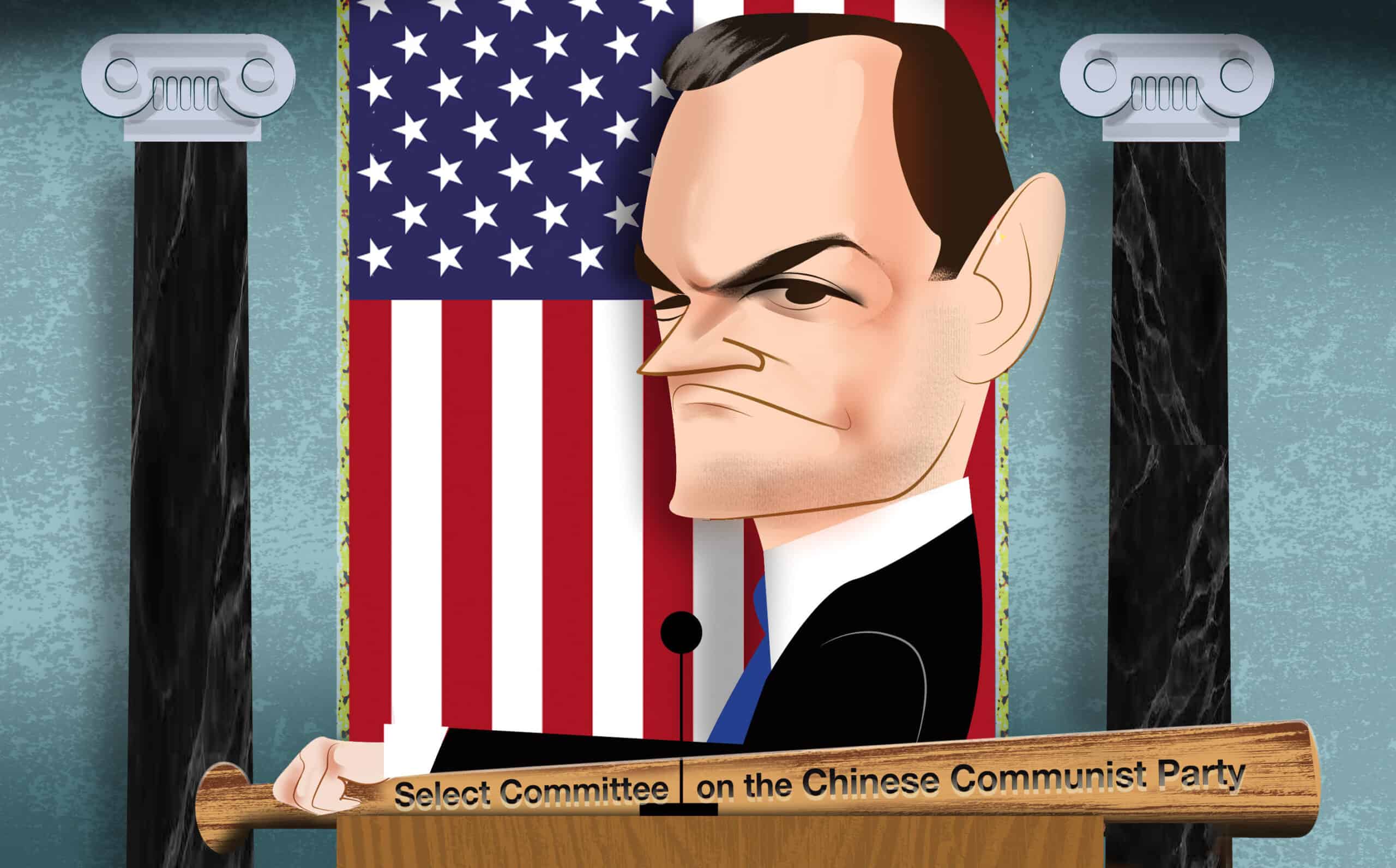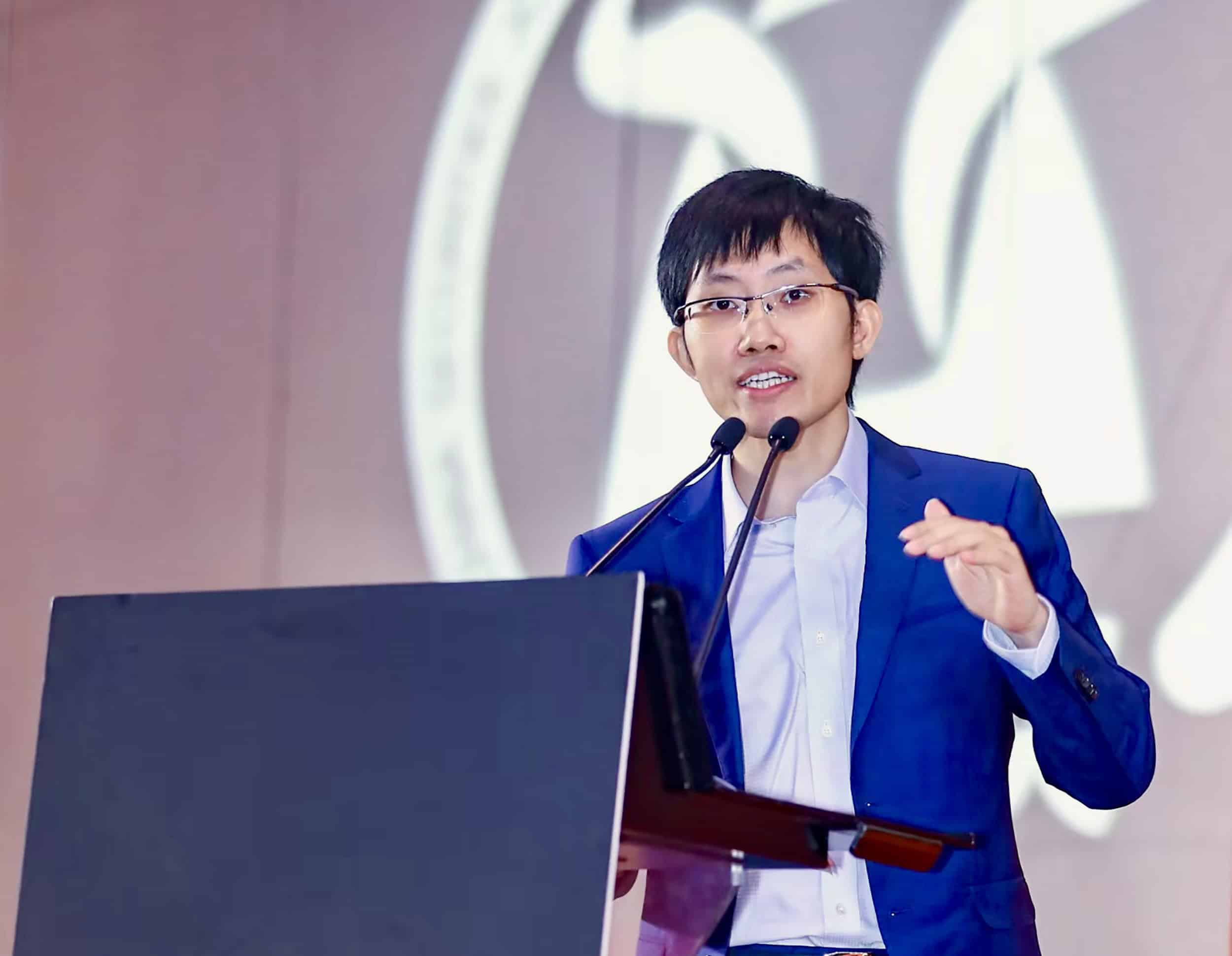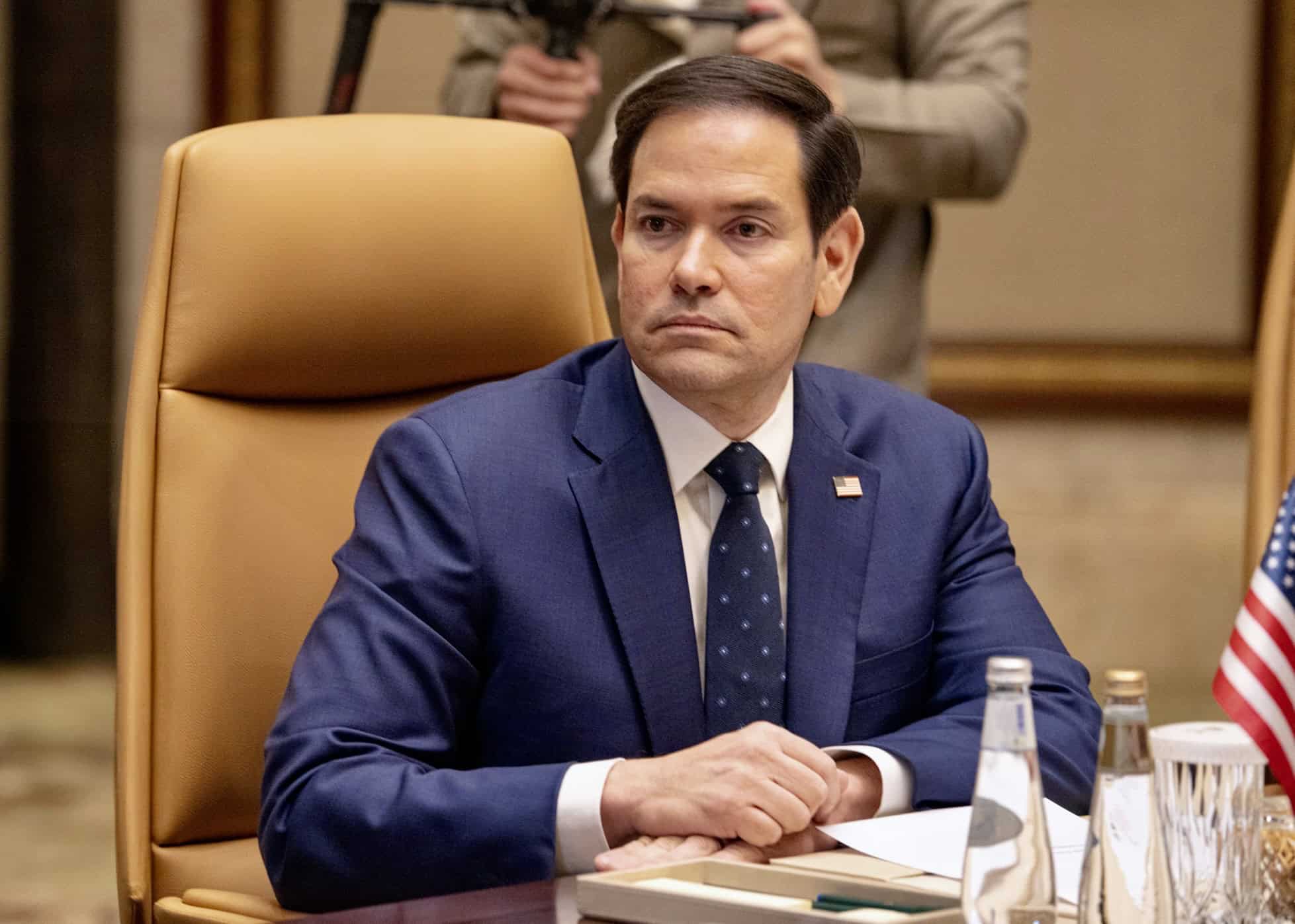
During his second deployment to Iraq, in 2008, then-Captain Mike Gallagher discovered a “bad guy” in a couch. As the commander of a Marine Corps human intelligence unit in Al Anbar province, he had been searching for this particular suspect for months. Finally finding him in plain sight — albeit squeezed into furniture — seared something lasting about “the fog of war” into Gallagher’s psyche.

“I knew this very small portion of land in western Iraq better than any other American there,” the now-congressman from Wisconsin told The Wire China. “But it still was very difficult to know what was going on.”
As Gallagher watched the surge bring “remarkable” security to Al Anbar, however, the young Marine gained some clarity, especially when it came to U.S. foreign policy. That is, he became convinced of the overriding importance of U.S. military might.
“In general, it is wise to speak softly and carry a big stick,” he says, sitting in his D.C. office. “But the big stick is the most important form of communication.”
Gallagher is regularly referred to as a “rising star” in Washington, and if his trajectory is any indication, there are few faster ways to rise in contemporary Washington than by sticking it to Beijing. Since reaching Congress in 2017 as a political neophyte, the 39-year-old has become Capitol Hill’s loudest China hawk, and his chairmanship over the media-savvy U.S. Select Committee on the Chinese Communist Party has propelled the boyish Badger State politico to national fame.
“I’m not sure there’s anybody that has become the chair of such an important committee so quickly,” says Mac Thornberry, a former Texas congressman who once traveled with Gallagher on a congressional delegation to Asia. “That’s one of the most unusual things about Mike.”
Indeed, Gallagher came seemingly out of nowhere to become one of the most important voices on China. Susan Shirk, a former State Department official and the author of Overreach: How China Derailed Its Peaceful Rise, says that Gallagher, for better or worse, is now driving America’s China policy. When she recently met with a high-level American businessman in Hong Kong, she says he told her that “he no longer pays attention to any voices inside China beyond Xi Jinping. In the U.S., he only pays attention to Mike Gallagher.”
Mike Gallagher featured in a recent video posted to the Select Committee’s YouTube channel on the “3 C’s of the CCP”. Credit: The Select Committee on the CCP via YouTube
Gallagher, a tepidly anti-Trump Republican, was appointed chairman of the 24-member Select Committee by the former Speaker Kevin McCarthy in part because of his military intelligence experience. Founded in early 2023, the committee was inspired by the China Task Force, a 2020 body set up by the Texas congressman Michael McCaul to investigate China’s “deception and malign influence around the world.” (McCaul is now chair of the House Foreign Affairs Committee.)
Gallagher’s committee lacks legislative authority, but its stated mission is to “build consensus on the threat posed by the Chinese Communist Party.” Gallagher sees its primary role as “communicative,” demonstrating why the CCP “isn’t a distant, over there problem, but a right here at home problem,” he told The Wire.
As the face of the Select Committee — and by extension Washington’s new “competition” with China — Gallagher takes every opportunity he can to expose the bad guys hiding in plain sight. He and his team have crafted dozens of tightly-edited videos for social media wherein he narrates somberly about the CCP’s many abuses and threats.
He is as comfortable speaking in realist geopolitical terms (he has a PhD in international relations) as he is in moralistic ones when it comes to discussing China, a country he has never been to. This November, for instance, when Xi Jinping visited San Francisco, Gallagher shot a video in front of the Golden Gate bridge skewering the “big time American corporate executive[s]” who paid $40,000 to dine with the Chinese president. This sum, he needled, “may buy you a meal with Xi, but it can’t buy you a conscience.”
There is a kind of political competition to show who is the staunchest defender of the United States against the China threat. This committee is both a reflection of that and is also very much contributing to that itself.
Susan Shirk, a former State Department official and the author of Overreach: How China Derailed Its Peaceful Rise
Gallagher knows these videos are tapping into a growing reservoir of American frustration and fear. According to Pew polling, 83 percent of Americans view China negatively, and 84 percent view its military with concern — the most dismal rating since normalization in 1979.
This supposedly “bipartisan consensus” against China is a constant refrain of the Committee’s, whose second-in-command is Raja Krishnamoorthi, a Democrat from Illinois. In television interviews, Krishnamoorthi plays the calm cop to Gallagher’s pugnacious one, vaguely urging to “tone down the rhetoric” without ever really contradicting his colleague.

Gallagher, who habitually bemoans political gridlock, aims to mold this mutual agreement into a more aggressive foreign policy. He envisions the Committee as an “accelerator or incubator” towards this end. But where allies see a “knowledgeable” and “very effective chairman,” as one Republican member described him, critics see the alarmist figurehead of an emerging Red Scare redux.
“It sounds very much like a redo of McCarthyism,” says Mary Gallagher (no relation), a political scientist at the University of Michigan who closely follows the Committee. “‘China equals communism; communism must be stopped.’”
Shirk believes Gallagher “advocates for extreme positions,” such as wartime-level export controls, that have nevertheless begun to “anchor” the larger debate. “There is a kind of political competition to show who is the staunchest defender of the United States against the China threat,” she says. “This committee is both a reflection of that and is also very much contributing to that itself.”
Mike Gallagher addresses the room at the start of the “Discourse Power” hearing, November 30, 2023. Credit: The Select Committee on the CCP via YouTube
If it is a competition, Gallagher is nimbly outmaneuvering his peers. At a recent hearing — titled “Discourse Power: The CCP’s Strategy to Shape the Global Information Space” — the handsome and quick-witted Gallagher arrived fresh from an interview with CNN and kicked things off with a sly baritone: “In Xi Jinping’s view, the war has already started on the most important battlefield, which is your mind,” he said. At one point, amidst worried talk about social media, a young demonstrator brandishing a selfie-stick made for the exit, screaming, “Please don’t ban TikTok, I have 26,000 followers!” An older Congressman countered, “Gallagher’s got more than that!” (Gallagher, who is indeed intent on banning TikTok, does not have an account.)
Of course, America’s more assertive approach to China has been a bipartisan effort: The administrations of both Donald Trump and Joe Biden have characterized America’s relationship with China as a “strategic competition.” But in the realm of rhetoric, wherein Mike Pompeo once deplored Beijing’s “new tyranny,” the Biden administration is noticeably more reserved. The current president’s “dictator” comments notwithstanding, Biden’s emissaries have recently proven eager to calm the seas, with cabinet officials dispatched to China, fig-leaves in hand.
Gallagher opposes this kind of diplomatic bonhomie. In his “communicative” quest, he sees himself as a gadfly in a “two-level game,” gradually shrinking the political space for compromise to ensure that a more assertive approach is pursued. The Committee is his shrinking machine.

“It’s actually a feature, not a bug, of our system,” he explains, working his Hollywood eyebrows to dramatic effect. “It helps the president of the United States when he’s sitting across from Xi Jinping to be able to say, ‘You know what, I’d love to make a deal with you on fentanyl, but any deal would have to withstand the scrutiny of Congress, and I not only have to deal with the Raja Krishnamoorthi’s of the world, but I’ve got to deal with these hawkish Republicans like Mike Gallagher.’”
Regardless of whether this helps or hinders the White House in its high-stakes dealings with Beijing, there is no doubt that it is helping Mike Gallagher.
‘BARBAROUS COASTS’
Like Hemingway on bankruptcy, China’s entry into national politics happened “gradually, then suddenly.” In 2016, shortly after Gallagher launched his surprise congressional campaign from a Green Bay pizzeria once owned by his father, the presidential candidate Trump fumed about China’s “rape [of] our country” to raucous applause.
Yet Americans had been souring on China for some time. The Obama administration was infuriated when China began militarizing islands in the South China Sea after assurances it would not do so. Wall Street, once a reliable font of P.R.C. cheerleaders, had grown to detest what they saw as a litany of Chinese abuses, ranging from pilfered I.P. to forced joint ventures (though these gripes have mostly occurred behind closed doors and Wall Street remains, by and large, committed to investing in China). And much of the American public, fairly or not, blamed their economic malaise on the off-shoring blitz that had occurred after China entered the World Trade Organization in 2001.
Gallagher’s own views on China were less solidified. As a student and soldier, he had focused on the threats to American interests from the Middle East. As an undergraduate at Princeton, he studied Arabic and, upon graduating, attended Officer Candidate School for the Marine Corps.
“Being a military officer seemed like the hardest crucible I could throw myself into to see what I was made of,” he says, before waxing lyrical. “‘A lonely impulse of delight drove to this tumult in the clouds’ [William Butler Yeats]. I didn’t want to fly, but I had this weird desire to, you know, ‘sail forbidden seas and land on barbarous coasts’ [Herman Melville].”
While serving in Al Anbar, around 2007, Gallagher met Matthew Pottinger, a Marine and former China-based journalist who later became Trump’s deputy national security advisor. Pottinger was several years older, but the two often exchanged books and stayed in touch. Pottinger was, Gallagher says, “the first person that convinced me that I needed to widen my aperture.” (“Whatever the opposite of being performative on China is, that’s Mike Gallagher,” Pottinger told The Wire.)
Thanks in part to Pottinger’s influence, Gallagher pursued a more generalist approach for his PhD from Georgetown. (His dissertation, entitled “Changing Course: The Sources of Strategic Adjustment,” is about grand strategy in the Cold War.) Then, in 2015, when Gallagher was working on Scott Walker’s doomed presidential campaign as a foreign policy advisor, Chinese hackers infiltrated the Office of Personnel Management. The state-backed hackers stole thousands of federal employee records, including Gallagher’s.
It was a “big wake-up call,” he says. It made him think that “there was something going on here that I needed to pay more attention to.”
Around this time, Pottinger, an outside advisor to the campaign, mailed Gallagher a white paper he’d prepared that argued for a more confrontational approach to China. “That really influenced my analysis,” Gallagher says. The paper, which is not publicly available, argued that “China’s ambitions involve regional hegemony to achieve global supremacy,” Gallagher recalled, “Which sounded crazy in 2015 when I read it, but now it’s the stuff of Xi’s public speeches.”

When Gallagher announced his candidacy, in February of 2016, it was on a simple platform of bolstering national security. With 73.5 percent of his district supporting him, he arrived in Washington at the same time as Pottinger, who was initially senior director for Asia at the National Security Council, and Trump, who prided himself on getting “tough” with China. “We are no longer turning a blind eye to [China’s] conduct nor are we hiding our criticism of its Communist Party behind closed doors,” the Trump administration announced.
Gallagher says his constituents, some of whom export mink and dairy to China, are paying attention to the CCP too. The Covid-19 pandemic — and that “the Chinese government did everything possible to cover it up” — was an obvious entry point for many voters, but so too were economic gripes as well as “legit and sincere human rights concerns.”
“There’s a lot of people that understand this is something that needs to be dealt with,” he says. “It’s not just a hawkish Republican thing.”
Indeed, since Trump, China has lingered at the forefront of U.S. politics. But it seems to remain a particular point of focus for Republicans. At the latest Republican presidential debate, China was mentioned 42 times. Russia had less than a dozen mentions.
Gallagher knows he “came to China late,” but he’s leaned into his military experience to help frame and understand the challenge. On a solo trip to Taiwan in February, for instance, he focused on touring Taiwan’s defensive preparations against a Chinese invasion, otherwise known as its “porcupine strategy.” For the Committee, one of his early ideas was to stage quarterly hearings in which Pentagon officials would be forced to provide updates on “the porcupine-ization of Taiwan.” He would call these hearings, he half-seriously told The Wire, “porcupine-palooza.” (They haven’t materialized.)

More than most politicians, Gallagher prizes humor. A master of the disarming ice-breaker, he can hardly go ten minutes without deploying some self-deprecating quip. During a recent event outside the Capitol commemorating China’s White Paper protests, Gallagher was solemnly reciting the names of Chinese dissidents before a largely Chinese audience when he paused for a laugh line. “For those who criticize my pronunciation,” he said with a pleading grin, “I actually practiced so give me a little bit of grace on that.”
This Committee has allowed us to have those conversations in a respectful and collegial way, and I very much credit that to Chairman Gallagher’s leadership style.
Haley Stevens, a Michigan Democrat on the China Select Committee
This folksy style, alongside his reluctance for Trumpian squabbling, has won him friends across the aisle in a House defined by its division. “Some [on the Committee] want to be more hawkish whereas others want to promote cooperation and de-risking,” says Haley Stevens, a Michigan Democrat on the Committee. “This Committee has allowed us to have those conversations in a respectful and collegial way, and I very much credit that to Chairman Gallagher’s leadership style.”

His style has even earned him street credit from seasoned China watchers, like Oriana Skylar Mastro, a China-focused security expert who was in the same cohort as Gallagher for a fellowship hosted by the Center for a New American Security. Mastro says that she is less ideological than Gallagher when it comes to opposing the Chinese Communist Party, and she does advocate for toning down the anti-China rhetoric. But she appreciates what Gallagher has done in terms of getting the U.S. government and public to pay attention.
“Even if I disagree with Mike,” she says, “I support his efforts and what he’s trying to achieve, which is to move the systems to more effectively compete with China and protect U.S. interests.”
Of course, people have different interests in defining what those interests are.
FAULT LINES
In February, Gallagher traveled to New York City to stand outside of a secret “CCP police station” and give a speech wherein he equated the CCP with the mafia. Months later, he returned to convene with a group of corporate executives who, on condition of their meeting, required full anonymity.

Though Wall Street is more bearish than ever on China, many companies and Commerce Department free-traders have still been reluctant to realize Gallagher’s maximalist vision of further regulating the flow of capital between the U.S. and China. This roadblock — configuring his “economic statecraft” — rates among Gallagher’s biggest headaches. “The complexities of selective decoupling, or de-risking, are far more complex than I really appreciated at the start of this,” he says. “There’s no cost-free way to do it.”
The divide here is less partisan than it is sector-based, notes Eric Sayers, an A.E.I. scholar and former adviser to the commander of U.S. Indo-Pacific Command — which makes Gallagher’s job even harder. “When it comes to economic and technology policy actions like export controls, trade, sanctions and limiting capital flows — areas where U.S. actions would create winners and losers — there is much less consensus,” he says. “This is where you see major disagreements between the national security committees and other committees of jurisdiction being played out today.”
Gallagher’s Committee remains more or less behind him. In December, on the eve of the year’s last hearing, it released a splashy 53-page report focused on diminishing America’s economic relationship with China. The report urges Washington to “chart a new path that puts its national security, economic security, and values at the core of its economic engagement with the P.R.C. and invests in long-term American technological leadership.”
In drafting it, there were some quibbles. Democratic congressman Ro Khanna told The Wire that he “pushed very hard” for trade reduction assistance, which he got, while some farm-state Republicans worried about Chinese retaliation spoiling their biggest export market. But in the end, only four members, the Democrats Ritchie Torres and Jake Auchincloss and Republicans Dusty Johnson and Darin LaHood, voiced minor concerns with the report, largely over industrial policy.
All 24 signatories hope that the committee’s nearly 150 policy recommendations — including stripping China of its “developing nation” status and enacting the “Disclosing Foreign Influence in Lobbying Act” — will find their way into law in 2024.
“In terms of legislation, I believe that we are moving there,” says Stevens, the Michigan Democrat.
Sparking any actual legislation is a milestone that the Committee is yet to reach, but Gallagher says the committee will “be pushing very hard, hopefully in a bipartisan fashion, to do that over the course of the next year.”
Andy Bennett, Gallagher’s dissertation advisor and a professor of international relations at Georgetown, notes that, historically, committees in Congress can leave their marks in other ways too.
“The whole idea for the Department of Homeland Security was talked about in committees in Congress,” he says. “And it was sort of resisted by administrations until 9/11 happened. Then suddenly, they created this department.”

Both Bennett and Pottinger see Gallagher and the Select Committee as adding depth and substance to Congress. “The way that Congress is structured — where there is responsibility for different functions of the U.S. government, but not focus on specific adversaries — was creating a lot of problems; things were not well coordinated,” says Pottinger. The Select Committee, he says, has focused Congress on the China challenge and can make concrete recommendations.
But for Derek Scissors, an American Enterprise Institute scholar who believes that the Trump administration was far too soft on China, the Select Committee’s largely communicative role has been a supreme disappointment. “I wanted this committee to do something,” he says. “It was set up by Republicans, and Republicans control the House, and it’s a House Committee. But they haven’t done anything.”
Although members are optimistic that the Committee would outlast a change in House leadership, Scissors thinks their time is limited. “I am, on balance, expecting the committee not to survive to 2025 [if Republicans lose control of the House],” he says.
Indeed, several Democratic House members have expressed unease about the Committee’s work. In a January letter, 23 progressives led by Washington state’s Pramila Jayapal opposed the Committee’s creation, largely worried about its impacts on anti-Asian racism in the United States. “America can and must work towards our economic and strategic competitiveness goals without ‘a new Cold War,’” they wrote. In a June Foreign Policy essay, Gregory Meeks, the Democratic ranking member on the House Foreign Affairs Committee, warned against Washington’s reflexively “anti-China” turn, calling it “a shortsighted and dangerous gambit that can lead to reactive and counterproductive policymaking.”
For Gallagher, keeping the Committee’s own bipartisan bonafides intact might be the toughest challenge of all. “Beijing wants nothing more than this new consensus in Washington to break down and turn into another partisan fight,” says Sayers. “A big part of Gallagher’s job is preventing this from occurring.”
Although it’s not clear the Select Committee will outlive Gallagher’s chairmanship, Gallagher himself doesn’t seem to be going anywhere. His congressional seat is hardly contested, and he has already been pushed to run for Senate, with rumors of higher office circling around him. For now though the former Arabist says he is committed to countering China.
“My life’s mission is U.S. national security and the defense of our country,” he says. “At least for the short term or the midterm, and likely the long term, that will involve a heavy focus on China.”

Brent Crane is a journalist based in San Diego. His work has been featured in The New Yorker, The New York Times, The Economist and elsewhere. @bcamcrane




